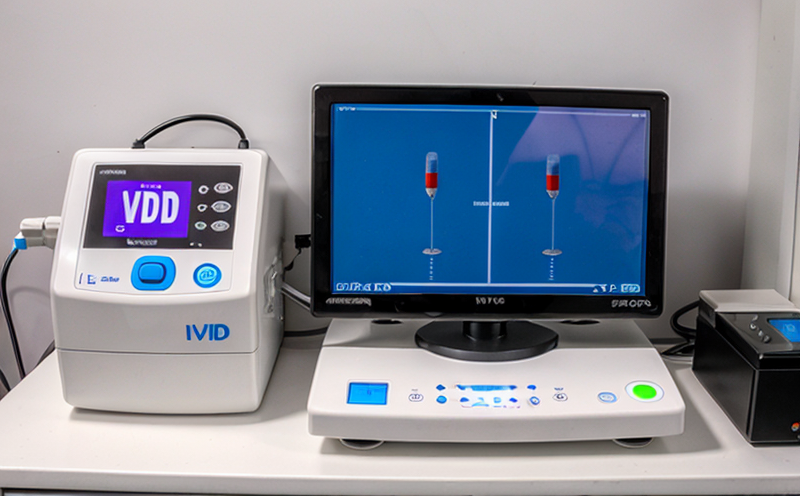ISO 17511 Calibration Traceability Testing for IVD Systems
The International Organization for Standardization (ISO) has developed a series of standards to ensure the reliability and accuracy of In Vitro Diagnostic (IVD) systems. One such standard is ISO 17511, which specifies requirements for calibrating measurement systems used in IVDs. This service ensures that all calibration processes are traceable back to international standards, thereby guaranteeing accurate results.
The testing process involves the following steps:
- Setting up and validating the calibration laboratory environment
- Selecting appropriate reference materials and standards
- Performing initial calibrations to establish baseline values
- Carrying out regular recalibrations over defined intervals
- Documenting all calibration activities in accordance with ISO 17511 requirements
The primary goal of this service is to ensure that the IVD systems used by healthcare providers are accurate and reliable, which directly impacts patient safety. By adhering strictly to ISO 17511 guidelines, we provide a robust framework for maintaining calibration traceability.
Calibration traceability ensures that all measurements can be linked back to a common reference standard, typically the International Prototype of the Kilogram or its replicas. This is crucial in the medical field because any discrepancy in measurement could lead to incorrect diagnoses and treatments.
In practice, this means that every IVD system undergoes rigorous testing before it enters clinical use. The process involves using known reference materials to compare the system's output against a standard value. If there are deviations from the expected results, corrective actions are taken immediately to bring the system back into compliance.
Regular recalibrations ensure that even as these systems age or undergo wear and tear, they remain accurate over time. This is particularly important in environments where precision is paramount, such as laboratories conducting complex diagnostic tests.
The service also includes a detailed report summarizing the calibration process, including any adjustments made during the recalibration phase. These reports are essential for maintaining compliance with regulatory bodies and internal quality control protocols.
Quality and Reliability Assurance
The reliability of IVD systems is paramount in healthcare settings. Ensuring that these systems meet the highest standards of accuracy and precision helps to prevent errors that could lead to misdiagnosis or incorrect treatment.
Our service focuses on several key areas:
- Validation of calibration protocols
- Verification of measurement traceability
- Assessment of system performance over time
- Evaluation of operator influence on results
By addressing these areas, we provide a comprehensive service that not only ensures immediate compliance with ISO 17511 but also helps to establish long-term reliability. This is achieved through the use of advanced instrumentation and meticulous documentation practices.
The validation process involves thorough testing under various conditions to ensure that the system performs consistently across different scenarios. This includes environmental factors such as temperature, humidity, and altitude, which can affect calibration results. By accounting for these variables, we provide a more robust service that helps healthcare providers trust their diagnostic tools.
The verification of measurement traceability ensures that all calibrations are consistent with international standards. This is achieved by using reference materials that have been certified by recognized bodies such as the National Institute of Standards and Technology (NIST) or similar organizations in other countries.
International Acceptance and Recognition
- ISO 17511: This standard is widely recognized across the globe for its rigorous requirements on calibration traceability. Compliance with ISO 17511 ensures that your IVD systems meet international standards, making them acceptable in markets around the world.
- EN ISO 13485: This European standard focuses on quality management and is often used in conjunction with ISO 17511 to ensure comprehensive compliance. Together, these standards provide a strong foundation for reliable IVD systems.
The global nature of healthcare means that consistency and reliability are critical. By adhering to international standards like ISO 17511, you can be assured that your IVD devices will meet the expectations of regulatory bodies in various countries. This is particularly important for manufacturers looking to expand their markets beyond a single region.
Environmental and Sustainability Contributions
- Sustainable Calibration Practices: Our service emphasizes the importance of minimizing waste during calibration processes. By using advanced techniques that require minimal reagents, we help reduce the environmental footprint associated with IVD testing.
- Energy Efficiency: The calibration laboratories are designed to minimize energy consumption through efficient use of resources and modern equipment. This contributes to a more sustainable approach to healthcare diagnostics.
The commitment to sustainability extends beyond the laboratory walls. By providing reliable IVD systems, we help healthcare providers make informed decisions that can lead to better patient outcomes while reducing unnecessary resource consumption.





